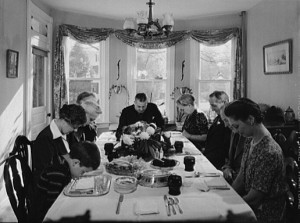The Bean has been a part of our family for many years, has clocked 200,000 miles, and has been repainted six times from a can, with a brush. (“The Bean,” June 26, 2010) Because this tiny car has become a legend in 9 states, admirers have occasionally helped finance its needs. One generous friend from Texas actually bought 4 new tires a couple of years ago, more than doubling the value of the car. (Thank you, Debbie!)
This week, though, all of us got a shock. When Nelson arrived home from 10 months in a Youth With A Mission Bible school in Montana, he pulled into the driveway in (gasp) a minivan! When we waved goodbye last September, he was driving The Bean. It was wearing a new coat of snow-camouflage appropriate to Montana’s snowy climate, ready to climb mountains with its new tires. (“Back, and Better than Ever,” July 14, 2011)
Then, during the school year as Nelson and 50 others studied the Bible from cover to cover in mind-boggling depth, The Bean performed faithfully, transporting students, making airport runs, being the reliable ride it had always been. But more and more its small size became a hindrance. So as license and registration expired, an inexpensive van took its place. The Bean had earned a rest.
This week, though, there’s been mourning in the family camp. Will we ever see The Bean again? “Why didn’t you bring it home?” we all asked Nelson, but of course none of us volunteered to finance new license and registration or pay to update several mechanical issues. In other words, if we really wanted The Bean to come home, we should have put our money where our mouths were.
Scripture says something similar, that we’re to be doers of the Word and not hearers only. We can listen to everything the Bible teaches and nod in agreement, but if we’re not acting on its principles, maybe Scripture’s truth has gone in one ear and other the other. After we hear it, God watches closely, hoping we’ll do something practical with what we’ve learned.
Of course it would be easier to study the Bible and then just keep it to ourselves. I’m a pro at that: “Thank you, Father, for such wonderful knowledge.” But if I take it in and lock it up, I’ve missed God’s intention.
When Nelson’s school ended last week, the staff told all the students, “You’ve worked hard these 10 months and learned a great deal, but God didn’t bring you here to stockpile knowledge so you could keep it to yourself. He wants you to do something with it.”
That’s what’s motivated Nelson (and others) to plan on returning to Montana in September for “The Titus Project,” an outreach focused on teaching them how to be teachers of others. And maybe when Nelson gets there, he’ll even be picked up at the airport by someone driving The Bean.
“Be doers of the word, and not hearers only.” (James 1:22)





